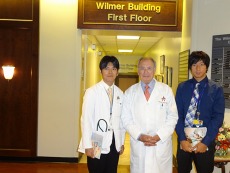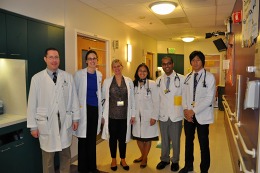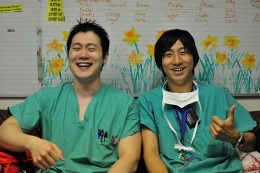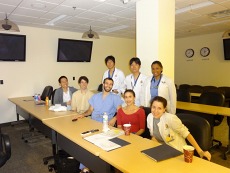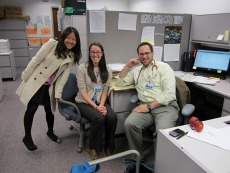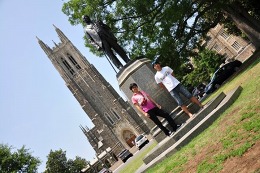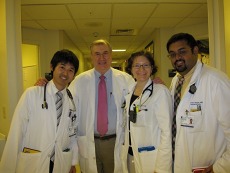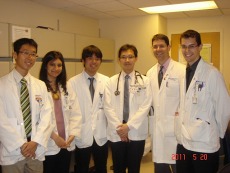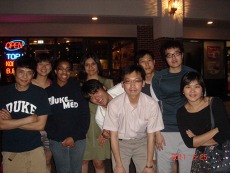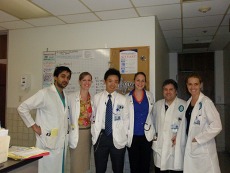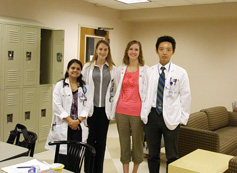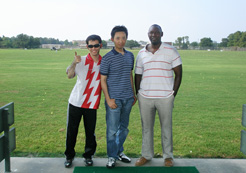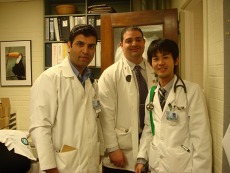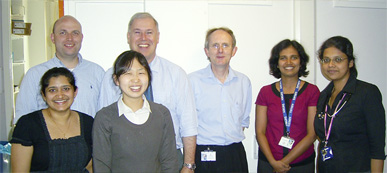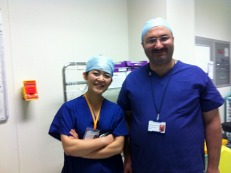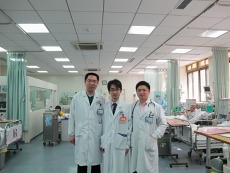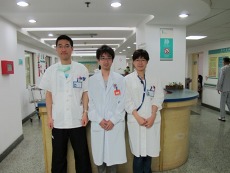Experience Reports (for Nagoya University Students) | 2011
Johns Hopkins Hospital
Taishi Okuno
I was allowed to do clinical clerkships at Johns Hopkins Hospital for about three months from March, 2011. Starting to write this report in this returning airplane, it is heartily felt that this fantastic experience that is long and profoundly memorable is about to end at last. Every day when I was trying really hard for this program is recalled, and it makes me feel kind of sadness. To switch my mind firmly toward next another goal when getting off this airplane, I will try to finish writing this report here.
Looking back my days, I recall those days that I was studying English and medicine really hard in Japan, hardships and achievements at Hopkins, many people I met, and wonderful memories with my friends. Now I exactly feel a very big sense of accomplishment and gratitude in being able to spend this wonderful time that I would say was a compilation of my university life.
The clerkship on the 1st month was done at anesthesiology. I was attached under one of the residents at anesthesiology, and I learned many things while helping them. Basically, I was just watching other than doing kind of chores. But in the operation room, I was actually allowed to do various medical procedures such as IV, A-line, intubation, and management of ventilation or blood pressure as students do in Japan. At first it was even difficult for me just to get proper medicine or equipments as residents told me since I couldn’t figure out their words precisely. But gradually, I was getting used to the workflow there. And I felt fun since I was feeling that I was being a little function in the operation room. Besides those things, I tried 2 times of overnight shift and also was able to go to see the laboratory twice which is managed by the professor I worked with in the operation room. In this way, I had so many precious experiences at this department. Moreover, it was so nice that I could observe many most advanced operation in various field.
I rotated at Hematology on the 2nd month. At this department, typical day is started from morning rounds, and then we have daytime conference and see some consulted patients. And the day is finished with evening rounds and lectures given by attendings. I had many hardships both in English and medical knowledge especially at this department. So I wasn’t assigned patients easily and was mainly just observing at first. At Hematology, I started this rotation with one of the students at Hopkins. He was very excellent and helped me a lot. With his help, I could have inpatients and some consulted cases at last. I actually got many medical knowledge through conferences and lectures and also had many practical experiences in this rotation. But moreover, it was extremely inspiring and great experience to work with this student for a month.
The last rotation on the 3rd month was done at Emergency Department. In this rotation, I got 2-3 patients on an average. I interviewed and did some physical exams on the patient, then quickly made an assessment and a plan, and afterwards I presented about him or her to my supervising resident. Then the resident gave me some feedback and went to see the patient with me again. I could learn both medical knowledges and terms that I should use everyday and usually they are applicable. So I was feeling that I was getting better at my job everyday. Other than those normal shift, I was able to attend lectures or practice s with students at Hopkins and also ride on ambulance. Besides, I was allowed to do a case presentation by Power Point on my last day. I was also experienced some medical procedures such as IV, blood gas, and sutures. So I learned so many things and had great experiences on this last month.
In addition to doing these rotation, I saw many japanese doctors who are working in America, traveled over America with my friends, visited my friends’ university, and hung about with other foreign students. Everyday in America was so eventful.
Actually, 3 months wasn’t so long. But days were absolutely eventful and challenging. I want sincerely to tell my deep gratitude to all people including my friends, doctors, and stuffs who supported my challenge. And I’m finishing writing this report while praying that many students will try this wonderful experience in the future.
Great Experiences at Johns Hopkins Hospital
Tomohiro Kato
I had a precious opportunity to study at Johns Hopkins Hospital in the US for 3 months. I practiced in the departments of hematology, general surgery and emergency medicine for 4 weeks each. I could learn what the medical care is like in the US as well as American culture. I also had a lot of great encounters. This 3-month experience was one of the best periods in my life.
In hematology, we saw inpatients in the morning, and did consultations in the afternoon. I also practiced in the outpatient clinic. As this was my first rotation in the US, everything was new to me and I saw a lot of cultural differences; chips and ginger ale in the wards and big wheel chairs .... I also saw various diseases that we rarely see in Japan such as sickle cell disease . Weekly ground rounds, conferences and study meeting we attended with lunch, were very interesting.
In general surgery, we, medical students did pre-rounds before 5 o’clock, did rounds around 5:30, followed by lectures or conferences. Then we started surgery as early as 7:30. On Saturday, as they don’t have cases, pre-rounds started around 7:00. We could decide which cases or outpatient clinics we could attend by ourselves as long as no doctors needed us. We were busy. During my rotation, I said to a medical student at Hopkins who was practicing after her night-call, ”You are so tough!”, she said with a big smile, “Everyone has to be.” which made me more motivated. Medical students at Hopkins helped me a lot; how to behave in hospitals, how to write charts and so on, but what made me very surprised was their diligence. They sometimes skipped their lunch and I learned to have protein bars in my pockets.
In Emergency departments, we had shifts, lectures, conferences, simulations, case presentations and so on. In the ER, we worked with residents. We took histories from patients, did physical examinations and presentations to the residents. Then we discussed what we should do to our patients and examined them together. Though the doctors were busy, they told me a lot; for example criteria and differencial diagnoses… We could do some procedures like suturing and rectal exams. It was a good experience to see violent things like gun shot wounds, knife stubbings and substance abuses.
I had not only those great experiences in hospitals but many nice encounters.
I talked with great doctors and researchers almost every week, which gave me a broad view. Thanks to a professor of UCLA, I had a chance to see cardiology there. I can’t forget I had a nice time in New York, Los Angeles and so on with foreign students and medical students who were doing clinical clerkships in the US. In the US, they often asked me, ”Do you know what you wanna do?” Actually, we do talk about what speciality we are interested in, but in Japanese we don’t ask in that way like what we want to do. This phrase made me think what I really want to do. I had more time to think about myself in the US.
Regarding all the unique experiences I could have while under the clinical clerkship, I’m very grateful to all the people who supported me.
Pennsylvania University
Mio Kanai
I went to Philadelphia from March to May 2011 in order to do the rotation in Pennsylvania University , Children’s Hospital Of Philadelphia.
CHOP is the top pediatric hospital in US and is separated in many specialties such as Pediatric Hematology, Neurology, Cardiology, CICU, NICU, PICU and so on. Also, Pennsylvania University is famous for its reputation for teaching and in fact, there were many doctors who were eager to teach us.
For the first month, I rotated Pediatric Hematology and for the second month, Pediatric Cardiology. In Pediatric Hematology, I was mainly in the consult team. There, I was able to take the patient’s history and do the physical exam and then presented to the doctors. Usually, I would give my presentation to the fellow and afterwards to the attending. Even though fellows were busy, they made time to corrected my presentation so that I could give a better presentation to the attendings. During this time, a student from Pennsylvania University was also rotating with me. She was extremely smart and also very motivated so that was very stimulative for me. At the end of the first rotation, I had to do a case presentation in front of about 30 people. The case was very interesting and it was fun to look up and read some articles about it. It made me nervous to give a presentation in front of so many English speaking people, but it was a great experience for me and I learned a lot.
In Pediatric Cardiology, I was in outpatient for the first week, consult for the second week and inpatient for the last two weeks. During the outpatient, the attending gave me lectures about heart murmur, how to read EKG of children and about cyanosis. Also, they taught me how to do the physical exams and let me listen to many kinds of murmurs. The doctors were very eager to teach me, so I wanted to be good enough for them and wanted to understand everything they said. However at the same time, I was getting upset of myself because of my poor knowledge and difficulty in understanding. During the consult, I was taking history and did physical exams and presented to the attending as I was doing in Hematology department. In the last two weeks in the inpatient, I went to see my patients before the morning rounds and presented every morning at the rounds. In the morning rounds, there were 5 to 6 doctors, 2 to 3 nurses and the patient’s parents, so I could of course not make a mistake and had to look confident in front of them but this actually made me nervous. While I was presenting, the attending often asked me questions and also gave me homeworks to study about certain things. Other than these, I had to give a talk about a certain cardiologic disease from embryology to management and also explain what is being discussed these days in the articles. I was told that this talk must be about 45 minutes. I’ve never done a 45 minute presentation even in Japanese, so I was extremely worried and prepared for it almost every day for two and a half weeks. After my presentation, the attending told me that my presentation was excellent so I remember that I was very happy and satisfied.
Other than the rotation, I was partying with the friends from Pennsylvania University and my dormitory. I was surprised one day when I came back to my dormitory and saw many people dancing and partying on the first floor. I really felt like I was in a foreign country and enjoyed it a lot. Also, I went to the home parties of Dr. Nishisaki who is now working at CHOP and of Dr. Kanei who is now working in NY. It was a great experience to talk with the doctors who are now working in America.
Thank you very much for letting me have a great experience as a medical student. I’m sure that the things I felt and learned will all be a great treasure of my life. I would like to say thank you to the doctors and officers of my university , CHOP, my friends, family and all the people who supported me.
Duke University
Tatsuya Yoshida
I studied at Duke University in North Carolina for three months. This university is in Durham, beautiful city. There are so much nature. We can see squirrels and hear the singing of birds. In summer we can also see fireflies. I felt time passed slowly because of this good environment. Duke University is a famous private university in the U.S.A. They have so many hospitals in North Carolina and help many people. There are many great doctors who like to teach at Duke hospitals. That’s why excellent young doctors in the U.S. apply this hospital residency program. I studied Cardiology, Pulmonary medicine and Endocrinology. This hospital regards students as team members, so they give us work.
In April, I belonged to consultive cardiology team. It was tough for me because doctors spoke faster than I expected and I didn’t get used to Duke’s system. Especially, I was worried about the big difference of performance from other visiting student. But I found the only thing I could do is doing small things step by step. I got used to the new environment gradually. I think I did good job finally. This month was so busy because there were a lot of patients. However, I was satisfied with this situation. I would like to be a cardiology doctor for now. I could see so many cases and the attending doctors with whom I worked were very kind to us. They like to teach students something despite their busyness. We were so busy this month but I really enjoyed learning.
In May, I took Pulmonary medicine. Basically I joined consultation team, but I can see the procedures like bronchoscopy and thoracentesis if we have time. When I studied at cardiology attending physicians are different every week. However, this department had the same doctor during my elective. This was a good system for me since I could understand the physician better. He gave me some knowledge from the point of his specialty when we solve one consultation. This let me find that physicians in U.S.A have their own specialty. I started to think that in the future I also have my specialty that many doctors would like me to ask. Pulmonary department has case conference, fellow doctor’s presentation and a lecture of attending doctor once a week. I was able to learn not only inpatient management but also various things from lectures. Totally I had a great time at this ward.
In June, I chose Metabolism and Endocrinology department. A curriculum is that first two weeks I belonged to inpatient service team and the last two weeks I went to clinic. Inpatient service team is a consultation team called DMS. Our work is basically to control the diabetes. I followed up some patient every day, but we couldn’t control some patients well. So I discussed my attending sometimes. This is a good memory for me. Unlike cardiology and pulmonology, endocrinology had physician assistants and Nurse specialists. They also taught me many useful knowledge from their point of view. We don’t have the same system in Japan, so this experience was valuable for me. I belonged to consultation team since I came here. That’s why the clinic was new for me and very fun. We saw the patients who were already discharged at the clinic as following up. As you know, they are healthier than inpatients. Finally, I could hear what people say without difficulties this month. They talked a lot and sometimes tried to talk to me. It was a lot of fun to talk to many people. Some doctors have their specialty clinic like osteoporosis and pituitary. It helped me focus on only one disease.
During this stay I met some alumni who studied abroad like us and are working in the U.S. now. I also met many Japanese doctors who is doing research or are working as a clinical doctor in U.S.A. This is valuable time for me because I was able to ask some questions about my future and they gave me useful advice. When I arrived at this university I faced some difficulties. But getting over them one by one made me stronger than before I came here, I believe. I do appreciate all the people who gave me a great opportunity; the doctors and officers of my university, Duke university, my senior students, my excellent classmates, my host family, my family. Thank you very much.
Duke University
Fumihiro Terasaski
In fall 2010, I was selected to study at Duke University. After the selection I had to do a lot of paper work and study hard so that winter had passed quickly. Then finally Mar 28th 2011, I arrived at Raleigh-Durham where Duke University is located.
My first clinical rotation was General Surgery.
Here is my schedule in Duke General Surgery. I wake up at 3am every morning and eat so much breakfast. After eating my breakfast I change my clothes and get on my bike. I ride on my bike for 10 minutes through dark streets and reach Duke hospital at 3:50 in morning. Then I start rounding by myself. First, I see medical records and nursing note to check vital signs and overnight events and fill progress notes. After that, I see my patients and do physical examinations and fill the notes again. Usually I have 3-4 patients so that I finish my rounding at 5:30 or 6:00. Or I would say I have to finish my rounding and prepare for my presentation until 5:30 or 6:00 because it is the time my chief resident comes to see students. At Duke hospital I had to make a plan for cure so that it is so difficult for me because it doesn’t happen in Japan. At Duke Students are always not shadows but doctors’ colleagues and labors. I understand students should work hard here. The more a doctor believes students the shorter time doctor spends with patients. After the rounding I attend conferences for about 1 hour and after that I go to OR and usually have 2 operations until 6pm-1am. Students may fill operative reports. Then we do evening rounding for about 1 hour and go back home. At home I do my reports or read articles so that I go to bed at 10pm-1am.
My second clinical rotation was Cardiology Consults. At the consult team each student is assigned to see patients everywhere in the hospital. Each student sees medical records and does physical examination and fills HPI/ PMH/ FH/ SH/ vitalsign/ medications/ physical examination/ blood test/ SOAP into a consult sheet( this will be an official record). After finishing everything we page a chief resident and do presentation and discuss medical plan and some articles for about 30 minutes. We read a lot of articles in the hospital and at home. I could have great time for studying and communicating with my friends at Cardiology Consults because I could have more time than General Surgery. My 3rd rotation was Obesity Clinic. Obesity Clinic is really unique in the United States. We can’t ignore obesity in the United States because over 1/3 of American people are over 30 at BMI. What we do at clinic is we communicate with patients and try to reduce their weight and control DM by low carb diet. We see a lot of patients at clinic and more skills for communication are needed at this clinic than General Surgery and Cardiology Consults. It is really important to have skills to motivate them. In some cases we decide to do operations so I can do perioperative clinics. After I see patients I discuss how to motivate patients with my chief resident. These days in Japan, the phrase` Let’s stop smoking with doctors’ is famous but in the United States I should say `Let’s reduce weight with doctors.’ I could enjoy my rotation here and also I could have a chance to do presentation for 45minutes.
In conclusion, I could have precious time at Duke University and I appreciate Dr. Kasuya, all doctors who helped me, Ms. Yamazaki, Ms. Aoki, Ms. Nishio, everyone who gave me great help. Thank you very much.
My Neurology Clerkship at Tulane University of Louisiana
Go Fujino Ph.D
As an international medical exchange student from Nagoya University School of Medicine, I attended the Neurology Clerkship at Tulane University of Louisiana. Tulane University was founded as a public medical college in New Orleans in 1834, and is known as one of the most prestigious Universities in the South part of the US. In the Neurology Clerkship program, students can choose from a list of possible hospitals they would like to visit. I wanted to experience various kinds of neurological cases, so I chose to study at Interim LSU Public Hospital (Medical Center of Louisiana at New Orleans). The hospital is known for having the highest level of primary and specialty care and a high level of education for students in the health professions.
My challenge on the first day of the Neurology clerkship was to communicate with everyone in the US in English. I was very much looking forward to this clerkship because I had been practicing taking patient histories, physical examination, and presenting cases at Nagoya University and English conversation school. The first day I had orientation and neurological lectures at Tulane University. I was inspired by seeing students in the US actively answer the lecturer’s questions, so I tried to answer as many as I could too. Although there were some points I couldn’t fully understand in the lecture, I really liked the atmosphere in this class. Specifically, students could ask questions freely and even if the student’s answer was wrong, it was not at all shameful.
On the second day of the Neurology clerkship, I worked with the Neurological consulting team at the Interim LSU Public Hospital. The team consisted of one Attending doctor, one to three Residents, and three students including me. The contents of the clerkship were mainly; (1) Clinical practice for inpatients at Interim LSU Public Hospital, (2) Clinical practice for outpatients at LSU clinic, (3) Neurological skills practice using simulations, and (4) Case conferences. At the clinical practice for inpatients at Interim LSU Public Hospital, students were notified about the types of illnesses they would encounter the night before patients were admitted. Some of the neurological illnesses I studied included; stroke, seizure, neuropathy, and others. The next day we each took our patient’s history and physical examinations, then we wrote the medical records, presented it to the Resident, and we discussed what we had presented. After the Resident had checked our work, we presented it and what we specifically studied about the patients’ disease to the Attending doctor at the morning conference. When the conference finished, the Neurological consulting team visited the patients and the Attending doctor also took physical examinations of our patients. If the doctor found something remarkable, she would let all the students make an examination of that patient. After the round, the Resident lectured us with several questions about neurological symptoms, diagnosis, and treatments. This clerkship required physical and mental toughness, but I really enjoyed it and had a very fulfilling time.
Finally, I would like to mention the impressive things about the Neurology Clerkship at Tulane University of Louisiana. (1) The clerkship goals, requirements and evaluations were clear. (2) The Attending doctor and Residents expected the same level of clinical performance from me as the other students in the US. (3) The basic education we received such as, how to take history and physical examinations, write medical records, and present cases were very informative. (4) Residents exposed me to many patients, and I was able to experience many varied cases. (5) Every day I had a chance to present and discuss my patients’ cases and receive feedback about my performances. (6) I had a lot of opportunities to present what I had learned from the patients’ disease to the Neurological consulting team. (7) At the end of the clerkship, there were exams and students worked and studied very hard during the clerkship. Furthermore, I experienced and learned a lot outside of the hospital, such as procedures of applying for the clinical clerkship in Tulane University, reserving accommodation, purchasing basic living items in the US, coping with everyday life issues, and communicating with many people.
Participating in the Neurology clerkship in Tulane University of Louisiana was a precious and unforgettable experience in my life. I would like to express my sincere appreciation to the Attending doctors, Residents, friends, and the exchange program coordinators at Tulane University. I would also like to express my gratitude to Dr. Sakamoto, Dr. Kasuya, Ms. Yamasaki, and all the staff of the exchange student training course and Office of International Affairs at Nagoya University School of Medicine.
My clinical rotations at Tulane University and Medical University of Vienna
Kentaro Mori
I feel a little bit excited by the foreign atmosphere even though it has already passed several days since coming back to Japan. As a exchange student, I went to Tulane University in U.S.A and Medical University of Vienna and took part in clinical clerkship there. The reasons why I applied to this exchange program are that I longed to experience U.S medicine, which is known as the highest level of it and I am so interested in General Practice in Europe.
The first rotation in Tulane university was Endocrinology. To be more specific, what I did was shadowing of a fellow doctor in outpatient clinic and following up of my patients in university hospital. In addition, it was also my duty to go to another outpatient clinic and taking patient’s history, doing physical examination, and present the patient’s case including my differential diagnosis to attending doctor. During this rotation, a impressive thing for me was that there was nearly always other specialist who was also following my patient when I went to patient's room.
The second department was Neurology. I belonged to a stroke team, which gave me a role to follow up around 2-3 post-stroke inpatients. In this team, I needed to understand not only a result of neurologic exam but also vital signs, laboratory data, physical exams generally, and sometimes even therapeutic drug monitoring. Therefore, it takes much time for me to get used to the work. Additionally, it was unlucky that I have to pick up important information of the patient from an illegible handwriting. Because it takes much time, I always went to the hospital at 5 am in order to prepare for my presentation of the patient case before a pre-round with resident. After pre-round, we usually took part in a round with attending doctor. And if we get news of new patient, we quickly run into a emergency room. In this rotation, I was pressed for time constantly. However, I have never felt such a strong sense of fulfillment before that I joined the team as a medical student and was taught about such as treatment of the patient case by the resident.
Through these two months in Tulane University, I learned two valuable things as a medical student. First thing is about U.S medicine. To be sure, we can say that it offers high quality medicine if we give a consideration only to a point of view that many kinds of specialists follow up a particular patient together. But actually, advanced specialization and subdivision result in increasing cost of medical care. In turn, it is becoming more and more difficult for those with no insurance to access to medical care.
The system which provide high quality and expensive care for relatively wealthy people and cannot do for those with no insurance was quite surprising to me . The second thing is about medical education in U.S.A. It is worth paying attention to a fact that educational model which resident teaches medical student and attending teaches resident has established. Especially, It was impressive that attending tried to persuade the team by referring to articles when he gives feedback to medical student or resident about our presentation.
My third rotation was General Practice at Medical University of Vienna. Learning field was not at hospital but at GP’s office in rural area in Austria. A doctor allowed me to follow him all day and stay his home. The doctor examined approximately 70 patients every day and visited home for patients who were difficult to go to office because of their health problem. To my surprise, the doctor remembered family background and past medical history of all his patients in the village. Honestly speaking, I was overwhelmed by his strong responsibility for people in the village. Through this experience, I came to realize that his ability to deal with many kinds of complaint or health problem quickly derived from this strong responsibility.
The most valuable lesson during these three months is understanding that there is a criterion for a good physician without relation to the difference between medical system in each country. Owing to the exchange program, I could meet so many doctors. For example, I met Japanese doctors who works as a clinician abroad, a member of the United Nations or a researcher, as well as those in Tulane University or GP doctors in Austria. Such meeting taught me that a good doctor is a person who has a strong responsibility for people’s health. It is quite precious for me to learn it by meeting with doctors abroad.
Lastly, I would like to express my deepest appreciation for people who kindly supported me during this exchange program, especially Dr. Kasuya, Ms. Yamazaki, senior doctors, and friends who studied abroad together. Thank you very much.
University of Warwick
Anna Shiraki
I got a chance to visit the UK and study at University of Warwick for 13 weeks. I felt lots of anxieties before I left Japan, since this was first time for me to stay in a foreign country for such a long time. I found it passed so quickly, but I could learn a lot of things I wouldn’t have realized in Japan. I’d like to write about my stay in the UK.
I rounded six departments in all: A&E (Acute & Emergency), ICU, GP (General Practitioner), Palliative care & Oncology, Cardiology, and Paediatric Endocrinology. It was good for me to have Paediatrics clerkship at Birmingham Children’s Hospital (BCH), because this hospital is the central hospital, and all patients who have rare diseases are referred there. What I did at the hospital in the UK was not so different from what I do in Japan as a student, but it was worth to visit there. Besides medical knowledge itself, I got interested in the difference of medical system between the UK and Japan, many kinds of co-medical staff, and different cultural background.
First of all, they can take medical treatment for free and all people are registered by their GP. When they need to see a doctor, they have to contact with GP before visiting a big hospital, except emergency cases. Although GP surgeries are similar to clinics in Japan, they run their clinic with several doctors, and they have less facility such as Chest X-ray compared with Japanese clinics. I’ve concerned since I heard that patients have to wait for several weeks before seeing a doctor, but they try not to miss urgent patients. For example, one of the GP doctors works as an on-call doctor and pick up patients who need urgent treatment. Moreover, they have a rule about how to refer the patient who is doubted cancer; they have to fax to a hospital within 24 hours after they find some symptoms suggesting cancer, and the hospital has to see the patient within 2 weeks. This rule makes the duration problem shorter, but some patients suffer from the waiting time still now.
Secondly, I was surprised since they have more kinds of co-medical than Japan, and they can do what doctors do in Japan. While they need specialized education to become senior position, the trained staffs can do some part of doctor's work, and help doctors to concentrate on their more specialized work, like doing some research and considering how to treat. For example, trained Nurse Practitioner can do smear examination of cervical cancer and vaccination for babies and those who’re going to abroad, and Paediatrics DM nurse can get a consultation from patients about their blood sugar control and change the amount of Insulin injection. In the GP surgery, Nurse Practitioner can have outpatient clinic by themselves. Seeing this situation, I think over what we should do as a doctor.
I could feel their culture in medicine, too. One day I visited a Hospice, which patients can use for free, too, and they said they need £6 million per year besides the budgets from NHS (about £3 million) to maintain their service. Surprisingly, they can cover such a big money only with donation. For instance, charity marathon is held as one of charity event. The runners ask their neighbors and friends to donate to them, and runners give the money to the Hospice group on the day. In addition, more than 900 people work in the Hospice group as volunteers. One of the volunteers said, "My dad passed away in the hospice, and I got to think I’d like to help suffering people." I love the warm behavior of supporting patients not for duty, but for their heart.
Throughout this experience, I found we can do anything if we want to achieve and try to do our best. In fact, I felt difficulties in communicating in English. However, I could do more than I had expected. That’s simply because everyone supports me, and I’d like to appreciate all of them, especially Dr. Kasuya, Ms. Yamasaki, Ms. Nishio, doctors and officers in University of Warwick and BCH, doctors and seniors who gave us pre-lecture, classmates studying together, and my family. Thank you very much.
Report of medical elective at Warwick University in UK
Maiko Kurosawa
Since 1/3 population died of cancer in Japan, I got interested in oncology, especially medical cares to support cancer patients until the very end. In UK, the concept of hospice and palliative care has been well developed, and oncology has more than 50 years of history. In addition, National Health System (NHS) provides almost all medical service for free. Therefore, when I obtained a chance to do my elective at Warwick University Hospital in UK in this spring, I aimed to learn at least two points through elective, which are “the system of NHS” and “What kinds of cancer treatment and palliative care cancer patients can receive for free.”
I did my elective in Oncology and palliative care for 5weeks and hematology for 2 weeks. In UK, an oncologist is in charge of chemotherapy and radiotherapy for cancer treatment. Therefore a surgeon, an internal medicine physician, and an oncologist are always working closely for a cancer patient. In addition, a plan of cancer treatment for each patient is discussed by multidiscipline team which includes a radiologist, a pathologist, and specialized nurses as well.
In oncology, the consultant who I attached to was specialized in palliative care as well as oncology. She was facing to incurable patients every day and often had to tell tough information to a patient and their family. In that difficult situation, her way to approach the patient was very impressive. Even if she had to explain about severe situation, she always tried to give some hope as well as accurate information. I was always moved by her warm words. But, on the other hand, I realized the fact that she was able to spare enough time for each patient because, unlike Japan, sufficient number of doctors and medical staff were available.
Since I told her that I am interested in comprehensive cancer treatment, she introduced me to many different specialists, such as doctors in adult’s and children’s hospice, complementally therapist, chest surgeon, respiratory physician, medical chaplain, nurses specialized in end of life care, so on. Therefore I had great opportunities to learn their works and how they play roles in cancer treatment. I was impressed that each cancer patient was supported by many kinds of specialists until the very end, and many medical cares, including spiritual care, were provided for free. In addition, I found patients could also receive intensive medical supports from their local medical services. For example, when an end-stage patient wanted to go home, the patient and family discussed with a nurse specialized in end of life care to organize medical cares which they would need at home, and GPs (local doctor) and district nurses were mainly in charge of medical care at home. It was surprising that they could offer a medical staff that stays at home even for 24 hours.
In hematology, I learned hematologist’s works in clinic and ward following several doctors, and had opportunities to take medical history and physical examination from a patient, and made a presentation of that case. After my presentation, we had discussion about the patient. Furthermore, I participated in blood study session for junior doctors to learn how to diagnose based on pathological patterns of blood and also attended hematology class for medical students. When I joined hematology conferences which were held in the suburbs, I had chances to discuss about many topics, such as differences of medical system between Japan and UK, with doctors on the way.to and from the venue. Besides clinical study, the consultant who mainly took care of me in hematology invited me to his home party and concert held at church. It was my happy memory to talk with many people who had different background at the party, and went to the church together to listen to the masterpiece, “messiah”, composed by Handel.
Exciting 7weeks passed very fast, but I learned a lot of idea and hints which will help me to think about future Japanese medical system, especially cancer treatment and palliative care. Finally, I would like to express my sincere appreciation for teachers and staff that made great efforts to support this exchanging program. Thank you very much.
My Clinical Elective at Shanghai Jiao Tong University, Renji hospital
Tomoki Taki
I studied at Renji Hospital in Shanghai Jiao Tong University School of medicine for a month. I was a first student applying Shanghai Jiao Tong University in the history of Nagoya University School of medicine. At that time, the political relationship between Japan and China was not good. So I felt nervous about going to such a country. But I wanted to know what Cinese people think about Japan by myself. So I decided to apply for this program. I studied at the following departments of Renji Hospital: Emergency and Neurology.
Emergency department
I belonged to a team, which has one professor, one chief, and four residents. The team had nine bets of ICU and eight bets of the ward. Emergency department had other teams and other thirty seven bets. Our team had two rounds at 8:30 a.m. and 15:00 p.m. I followed these rounds. Dr. Wang and Dr. Zhongmin taught me patients’ conditions and pathology of desease in English.
Chinese Emergency has own wards and the doctor of that department see patients who have various deseases and need to see several departments, the patients who have to wait for the bet of another department and the patients of ICU. Each ward has one helper who cares the daily life of patients.
In addition to these wards, there are many bets at hallways. Many patients who are hopeless have to stay at hospital lying down this kind of bets for long term. Like Shanghai, the big city have too many people and the hospital have to see too many patients. The doctors can’t afford to such kinds of terminal patients. To improve these situation, the new building of internal medicine is planned to built. So this condition will be better.
Neurology department
The team I belonged to has one chief, one sub-chief, two residents and one student of Shanghai Jiao Tong University. Each residents see five patients. On Monday, Wednesday, and Thursday, the team without chief attended round. On Tuesday and Friday, all team members attended round. Chief checked the plans and diagnoses. After the round, chief taught residenst and students. The atmosphere of this ward was better than Japanese one because most of serious patients were seen at Emergency department. The student in Neurology department wrote prescriptions and application forms under one resident ,and changed gauzes.
Shanghai Children Hospital
Renji Hospital has children hospital named as Shanghai Children Hospital. This hospital is famous for pediatric cardiac surgery. The number of operations of pediatric cardiac surgery is largest in the world. I tried to apply for this hospital. But at that time, the doctor was very busy so they didn’t afford to accept foreign students. So I could not belong this department as a student, but a friend of mine who are student of this university was so kind that he showed me around this hospital. This hospital was built recently by an American designer. The ward is very similar to American style. The hospital has NICU and the standard of medicine is much higher than I expected. The government dose not allowed each couples to have more than one child. So patients grow their child as a treasure. Pediatricians in China are under big pressure.
Students of Shanghai Jiao Tong University
I stayed at international dorm in Renji hospital. Students of Shanghai Jiao Tong University also stay at this dorm. They took me to dinner and we talked about Japan and China. Japanese comics, TV games, dramas, and novels are very popular in China. These things encourage Chinese students to learn Japanese.
In China, there are big difference between hospital at urban area and rural area. In order to work at urban area, like Shanghai, students have to win the hard competition. So students have to study very hard.
As a whole, I was satisfied with this program. At first, I felt nervous a little because I can’t speak Chinese. But all of Chinese people were very kind to me, so I could stay there safely. I really appreciate all the people who gave such a nice opportunity to me; Dr. Kasuya and all the staff of the International Affair Office of Nagoya University, and my classmates who worked together. Thank you very much.
